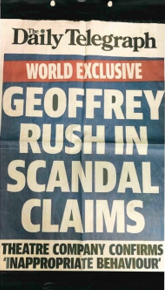
Rush v Nationwide News Pty Ltd (No 7) [2019] FCA 496

Introduction
The case Rush v Nationwide News Pty Ltd (No 7) [2019] FCA 496 involved a defamation claim brought by Australian actor Geoffrey Rush against Nationwide News Pty Ltd, the publisher of The Daily Telegraph newspaper.
Facts
The Applicant is Geoffrey Rush, an Australian actor.
The first Respondent is Nationwide News Pty Ltd, and the second Respondent is Jonathon Moran. Nationwide News Pty Ltd is the publisher of The Daily Telegraph newspaper. Jonathon Moran is a journalist at The Daily Telegraph newspaper.
During the 2015-2016 production of Shakespeare’s ‘King Lear’ at the Sydney Theatre Company, actor Eryn Jean Norvill made allegations of sexual harassment against her co-star Geoffrey Rush.
On 30 November 2017, The Daily Telegraph newspaper published a ‘world exclusive’ story concerning the behaviour of Rush during the Sydney Theatre Company production. The articles included claims of “inappropriate behaviour” and “sexual misconduct”.
It was heralded by a poster that screamed “GEOFFREY RUSH IN SCANDAL CLAIMS” and “THEATRE COMPANY CONFIRMS ‘INAPPROPRIATE BEHAVIOUR’” (see image 1 below).
The front page of the newspaper depicted a promotional portrait of Rush as a deranged Lear, above the headline “KING LEER”; no doubt an intentional pun (see image 2 below).
On 1 December 2017, The Daily Telegraph included a front page story with the headline declaring “WE’RE WITH YOU” and reported that two actors from the Sydney Theatre Company had come forward to support the actress (see image 3 below).
Rush claimed that the publications conveyed defamatory imputations about him. These imputations included that he engaged in inappropriate sexual behaviour and that he is a sexual predator.
Rush claimed that the articles have caused him to be subject to ‘hatred, ridicule, and contempt’. He claimed that his character and reputation as an actor have been severely harmed, resulting in personal hurt, embarrassment, and significant loss and damage.
Rush sought damages, including aggravated damages, as well as special damages to compensate for economic losses.
Nationwide and Moran claimed that the publications did not convey the alleged imputations. They also claimed that the alleged imputations were substantially true.
Nationwide and Moran maintained that Mr Rush had in fact engaged in scandalously inappropriate behaviour of a sexual nature in the theatre. Their defence was based on specific claims by Ms. Norvill that he acted in a sexually predatory manner towards her.
| Image 1 | Image 2 | Image 3 |
 |
 |
 |
Issues
Whether the articles published by The Daily Telegraph were defamatory.
Whether the defence of truth was applicable.
Decision
Wigney J found that the respondents had defamed the applicant by publishing the articles.
Regarding the defence of truth, the Court held that the allegations made against Rush were not substantiated with sufficient evidence to meet the required standard.
The Court awarded Rush a record-breaking amount of $2.9 million in damages, which included $850,000 in general damages and $1.95 million in past and future economic loss.
Reasoning
Were the Imputations conveyed by the Matters complained of?
The court analysed the language used in the publications. The publications did not directly or literally state the imputations that Rush alleged. However, the publications did nonetheless convey some or all of the alleged imputations to the ordinary reasonable reader. The ordinary reasonable reader would have ‘read between the lines’ and understood that those meanings were imputed by the publications.
The Poster conveyed the imputation that Rush had engaged in scandalously inappropriate behaviour in the theatre. However, it did not convey the imputation that Rush engaged in sexually inappropriate behaviour of a sexual nature in the theatre.
The 30 November 2017 Article conveyed that:
- Rush is a pervert;
- Rush behaved as a sexual predator on the production;
- Rush engaged in inappropriate behaviour of a sexual nature on the production; and
- Rush engaged in inappropriate behaviour against another person over several months while on the production.
The 1 December 2017 Article conveyed that:
- Rush committed sexual assault on the production;
- Rush behaved as a sexual predator on the production;
- Rush engaged in inappropriate sexual behaviour;
- Rush had inappropriately touched an actress on the production;
- Rush’s conduct in touching an actress was so serious that the Sydney Theatre Company would never work with him again; and
- Rush had falsely denied that Sydney Theatre Company had told him the identity of the person who had made a complaint against him.
The imputations were considered harmful to Rush’s reputation and capable of lowering him in the estimation of others.
Were the Imputations substantially true?
Section 25 of the Defamation Act provides as follows:
‘It is a defence to the publication of defamatory matter if the defendant proves that the defamatory imputations carried by the matter of which the plaintiff complains are substantially true.’
Section 4 of the Defamation Act provides that ‘substantially true’ means true in substance or not materially different from the truth.
Nationwide News Pty Ltd relied on the defence of truth, arguing that the allegations made against Rush were substantiated and supported by evidence.
However, the Court concluded that on the balance of probabilities, the allegations could not be proven to be true.
It was held that the evidence presented by Ms. Norvill was weak and fell short of establishing the truth of the imputations.
Wigney J emphasised that the defence of truth required “clear and cogent proof” of the allegations, which was not met in this case.
Need Defamation Help?
Please get in touch with us today via phone or the contact form on this page.



